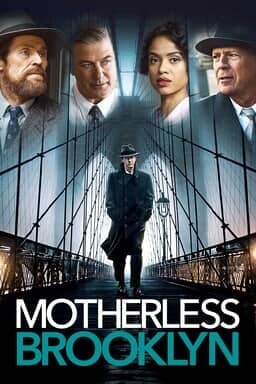I recently watched “Motherless Brooklyn” and
“Richard Jewell” which are both hot off the red box and they are a stark
reminder of the way two films can hint at the ideologies of their makers and my
evolution in reading them.
“Motherless Brooklyn” stands out primarily
as a great film and showcase for Edward Norton who co-adapted the book and
directed in addition to playing a starring role. Stylistically, the film takes
its cues from film noir with a detective falling deeper and deeper into a well
of obsession and that’s not an easy genre to re-capture, let alone put a spin
on. On top of that, it’s a little “Chinatown” meets “Rain Man” as Norton’s
character has tourette’s syndrome which takes guts: Imagine the potential this
has to be disastrous both to film noir and the disabled community if handled
sloppily.
Like one of the great neo-noirs,
“Chinatown”, (the vast majority of noirs came out in the 40s and 50s and
“Chinatown” was in the 70s, “Motherless Brooklyn” seeks to make infrastructure
sexy. “Chinatown” explores how the city of Los Angeles was built through
irrigation systems. “Motherless Brooklyn” derives from the story of Robert
Moses who cut through a tremendous amount of red tape and created a series of
bridges and highways that some say modernized New York and allowed connectivity
between the five boroughs at an unprecedented level.
At the same time, Moses wasn’t without his
flaws: He bulldozed neighborhoods for urban-renewal projects and designed the
highways on Long Island so that buses couldn’t travel. For those who are look
at society and policy through the lens of racist verse not racist and want to
disregard all the shades of blue in the middle, this makes him target for a
certain negative revisionist history that’s becoming popular (even though
classist doesn’t necessarily mean racist and a man’s views are a product of his
time to some degree). Decisions to not build certain highways that could
benefit poorer populations are now being characterized as racist because of the
interchangeability of class and race.
Nonetheless, while there is room for
critique about whether Moses or his policies were abnormally racist, as CityLab
has artfully done, “Motherless Brooklyn” chooses to eliminate any nuance in
the argument. By my tastes, it’s narrowly within the realm of artistic license,
but the whole movie can definitely be classified as woke. The film has a black
woman as a love interest for the character and celebrates intersectionality by
suggesting the black community and disabled as fitting allies for one another.
Additionally, the film’s moral universe might be seen as giving a bigger moral pass
to the vices of the black community than the community to which Lionel comes
from.
I generally argue that film makers have the
right to tell the kind of story they want without getting politically skewered,
so even if the film preaches a more woke philosophy than I generally subscribe
to, I’m comfortable with the film though cautiously aware of its slant when
comparing it to the real-life figures and times it is portraying.
The larger question, however, is whether “Motherless Brooklyn” exists in a vacuum.
If this didn’t exist alongside the Ava DuVernays and Spike Lees that see their
mission as filmmakers to be synonymous with their activist views, I might be
more ok with the film’s lean. Alternatively, the sphere of film critics out
there lean heavily liberal and will take such messages about Robert Moses and
use this film to write insufferable and likely factually incorrect essays.
On the other end of the spectrum, we have film maker Clint Eastwood who is a popular
figurehead for conservatism (especially around the time of the McCain
and Romney campaigns). His film “Richard
Jewell” centers around the true story about a man who was accused of the
Atlanta bombing he didn’t commit. Because the man was a cop and the FBI tries
to latch onto the same aggressive tendencies any cop might have, the film aligns
pretty heavily with the blue lives matter. The film’s implication (based pretty
heavily on the facts)
also is that Jewell was targeted because he was fat and ungainly so it also
doubles as a weird kind of body-shaming PSA.
And here’s the odd thing: I’m not a conservative
at all and I’d like to think my contempt for the current leadership of that
party is well-documented. But in the cultural sphere? I’ve had a shift (also
well-documented) and from where I’m standing it looks the more conservative of
these two films is a more compassionate portrait of a historical event. Why?
Eastwood’s film is about reconsidering preconceived notions towards a fairer
view of reality. In contrast, “Motherless Brooklyn” is about finding comfort in
sticking its protagonist (and audience) between familiar notions of good and
evil even if they’re not particularly accurate. I never thought I’d live to see
the day when I liked the film with the more conservative slant but there it is.


No comments:
Post a Comment